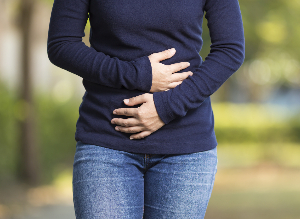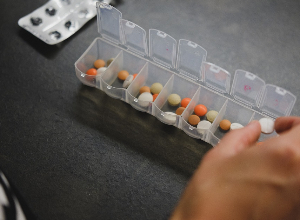Natural tips to live better with Crohn’s disease
Published Jan 9, 2021 • By Gilda Teissier
Crohn’s disease is a condition that may affect any part of the entire gastrointestinal tract - from the mouth to the anus. However, the parts of the gut which are most commonly affected are the ileum, colon, and anus.
There is no cure or quick fix for Crohn’s disease, but there are a few natural methods that can help ease the pain and put an end to flare-ups.
What is Crohn’s disease? What are some natural remedies that can ease the pain? What tips can help with flares?
We tell you everything in our article!

What is Crohn’s disease?
Crohn's disease is a type of inflammatory bowel disease that causes inflammation of the digestive tract, which can lead to abdominal pain, severe diarrhea, fatigue, weight loss, and malnutrition. It is a painful and debilitating condition, and can sometimes lead to severe complications.
Any part of the small or large intestine can be involved continuously or in segments. Depending on the individual, the condition can be confined to the colon, or the inflammation can spread into the deeper layers of the bowel.
The signs and symptoms of Crohn’s disease can range from mild to severe. They usually develop gradually, but they come on suddenly and without warning. Because the disease develops in relapses, there are periods of remission, which is a period of time when there are no signs or symptoms.
Some of the most common symptoms of Crohn's are diarrhea, fatigue, fever, blood in the stool, abdominal pain and cramping, mouth sores, reduced appetite, weight loss, and pain or drainage near or around the anus.
People with severe forms of Crohn’s may also experience kidney stones, iron deficiency, delayed growth or sexual development, and inflammation of skin, eyes, joints, liver or bile ducts.
According to the Mayo Clinic, there's no known cure for Crohn's disease, but therapies can significantly reduce its signs and symptoms and even lead to long-term remission and healing of the inflammation.
Natural remedies to relieve pain
Despite medical progress, the exact cause of Crohn's disease remains unknown. Doctors do know that diet and stress can aggravate the condition, and that factors such as heredity and a malfunctioning immune system probably play a role in its development.
Given that diet plays a role, there are several natural remedies that have proven to be effective in trying to keep Crohn’s disease at bay or even help during flares. The one thing that should always be taken into consideration is that every person is different, even when it comes to this condition. These remedies therefore generally help a large percentage of people with Crohn's, but it is advisable to talk to your doctor and/or try them one by one and see if they work for you. The remedies are:
- Probiotics: These aim to restore the balance of the intestinal flora by adding helpful bacteria. You can find them in foods such as “live culture” yogurt, sauerkraut, and miso.
- Prebiotics: These provide fuel for the helpful bacteria growing in your digestive tract. You can find them in bananas, onions, leeks, Jerusalem artichokes, asparagus, and dandelion greens.
- Pineapple extract or Bromelain: This may be able to fight inflammation. Scientists believe that it may help to ease Crohn’s symptoms, but it has only been tested in the lab so far.
- Aloe vera juice: Its calming effects may help digestion and improve immunity. Start slowly, as aloe vera can also cause diarrhea.
- Omega 3s: A popular remedy for many health problems involving inflammation, you can get them by eating fatty fish such as salmon, mackerel, and herring. They’re also available in pill form.
- Boswellia serrata extract: Several pilot clinical studies have investigated the effectiveness of Boswellia serrata gum resin extract for people with Crohn’s disease.
- Chios mastic gum: The resin produced by the Chios mastic tree on the Greek island of Chios possesses a large number of antioxidant substances, which can reduce inflammation.
- Potassium and magnesium supplements: Magnesium and potassium supplements can help with vomiting and nausea, as well as the complications that come from chronic diarrhea.
In addition to increasing consumption of the above mentioned products, always keeping in mind what works best for you, it is also important to know that there are some foods that should be avoided as, in most cases, they tend to be harmful to people with Crohn's disease. These are:
- Gluten
- Fried foods
- Dairy
- Spicy foods
- Soda and other sugar-sweetened beverages
- Margarine, shortening and lard
- Red meats and processed meats
A few tips to help with flares
If you are dealing with a severe flare-up, you may want to consider a liquid diet to give your system a rest. You can also try the GAPS or FODMAP diets. A strict anti-inflammatory diet may be your best bet.
Another good way to avoid or relieve flares is to be aware of foods to which you might be allergic or intolerant, and so avoid them to eliminate potential triggers. You can have a food sensitivity test done by your GP's office or through a laboratory. You can also keep a food diary, recording everything you eat for a month or two, including the quantities and the symptoms experienced.
In addition to bowel rest, to help combat flares, you can try to get more sleep, rest, drink plenty of water, minimize stress and strenuous exercise and take naps as needed. Allow your body time to heal.
Conclusion
The most important thing is to listen to your body and always consult your doctor. One size does not fit all, so you really need to test to see what works best for you and be patient.
Was this article helpful to you?
Share your thoughts and questions with the community in the comments below!
Take care!
Sources:
- Crohn's Disease. Mayo Clinic
- Effect of an Enteric-Coated Fish-Oil Preparation on Relapses in Crohn's Disease. The New England Journal of Medicine.
- Probiotics for Crohn's disease: what have we learned? US National Library of Medicine.
- Omega 3 fatty acids (fish oil) for maintenance of remission in Crohn's disease. National Library of Medicine.
- Can fish oil maintain Crohn's disease in remission? National Library of Medicine

 Facebook
Facebook Twitter
Twitter


